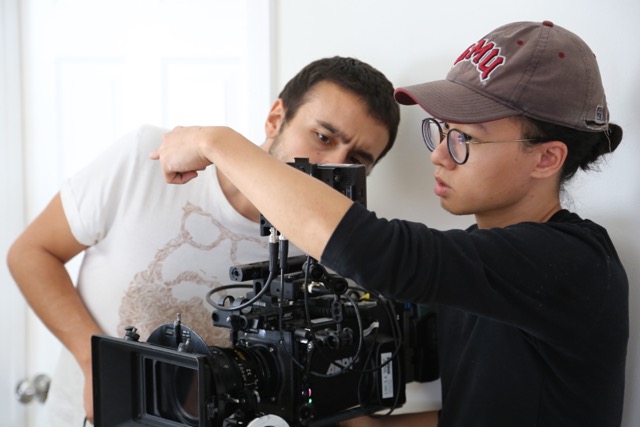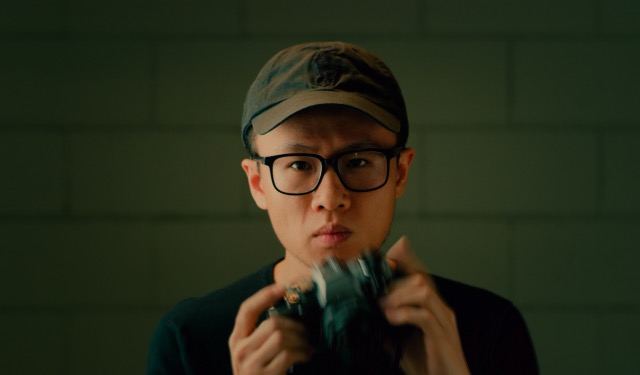Tools don’t make you a professional. A degree might give the appearance that you are a professional but even that is no assurance. Skill makes you capable of doing the job but it doesn’t make you excel to the standard of success. Possessing a quality that allows you to enrich the lives and or pursuits of others while achieving your own goals, that is real success. It’s this formula which cinematographer TinNgai possess in such abundance and which has led to his popularity among peers and collaborators as well as copious recognitions for his own work and the films which he has contributed to. While the cinematic characteristic style he wields is present in all of the various productions he has been a part of, it’s the direction of his work and the stories he has chosen to help tell which define him. He’s highly aware that his position behind the camera as a DP is a supremely powerful means by which to place the audience within the hearts and minds of the characters and real life individuals he captures. From middle-class Americans to immigrants who tap into the potential the US offers all who arrive here to those whom risk their lives to save others in mortal danger, TinNgai commands the lens in a way that provides empathy to a much needed world.

TinNgai understands that he has the power to create connection. Some of these are more accessible to the majority of the American public, as seen in Mary Mary Quite Contrary for which Chan directed and served as DP. With a notable cast that includes Chad Morgan of Michael Bay’s Oscar Winning Film Pearl Harbor, this film presents how many of us feel that we are on the verge of losing control of the world we have created around us. Whether patient, mental health professional, or family member, we all feel the fear of the loss of that which we hold most dear to us. TinNgai’s utilization of camera angles, perspectives, and lighting choices resulted in a drove of awards for his work on Mary Mary Quite Contrary including Best Cinematography from the New York Cinematography Awards, London Independent Film Awards, Rome Independent Prisma Awards, and many others.

You can understand something about who a filmmaker is by the projects they choose to take on. This occupation is rarely one which offers a 9 to 5 work day, the surroundings of family, and one’s own comfortable bed each night. For a professional such as TinNgai, this is beneficial in terms of relating to the subjects of her films. He recently completed his role as cinematographer on director Vincent DuLuca’s feature documentary Desert Angel about U.S.-Mexico border savior Rafael Larraenza whose lifelong commitment to rescuing immigrants lost in their trek to gain entry into America is a modern depiction of selflessness. Elderly and confronted with the mortality of his own body, Larraenza’s crusade to help those whom are literally lost places a face onto the supposedly nefarious individuals presented by some media outlets and politicians. Capturing the footage for Desert Angel placed Chan in the same life threatening environment that Rafael and those whom he aids are constantly immersed within.

Immigrant stories are deeply important and connected to TinNgai as a filmmaker and as a person. An immigrant himself, Chan related to and was enthusiastic about taking on the cinematography duties for The Story of Lily Lee Chen: Becoming the Historical First. A recipient of the President’s Volunteer Service Award from the Obama White House and established in history as the first female Chinese-American to serve as mayor of a US city, Lily Chen contrasts any notion that immigrants do not make America a better country. In her nearly half-century of social work and political career, Lily Chen’s story serves an example that the Asian American community and the entirety of American needs to be exposed to.
Artists are different for a number of reasons but maybe most benevolently because they desire at their core to understand people. Rather than being influenced by ethnicity or income level or any such quality, people like TinNgai Chan want to observe and connect the world. Having filmed in Turkey (on The Pepperman, Official selection of the Black Hills Film Festival, Dalmatia Film Festival, Seattle Film Festival, and Marbella International Film Festival), America (aforementioned films as well as the Pigeon Movie, The Choir Documentary, and others) and his work for more global productions like the Jane Goodall United Nations/Interfaith Rainforest Initiative (featured on IRI’s website), TinNgai possess an inherent quality in his work that avoids categorization as a cinematographer with a national point of origin. This is a product of his desire to always find a point of unison with the subjects of his films and thereby allow us all to gain that beneficial intersect.


Be the first to comment on "Creating Cinematographic Connectivity: TinNgai Chan"